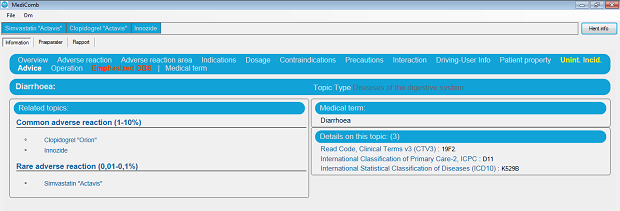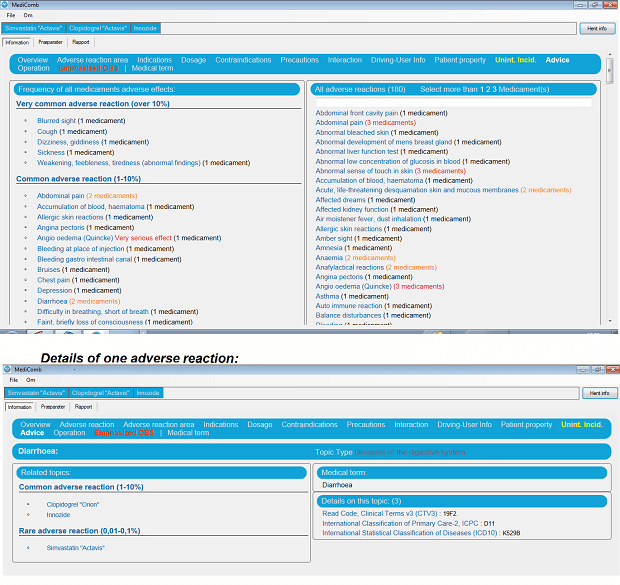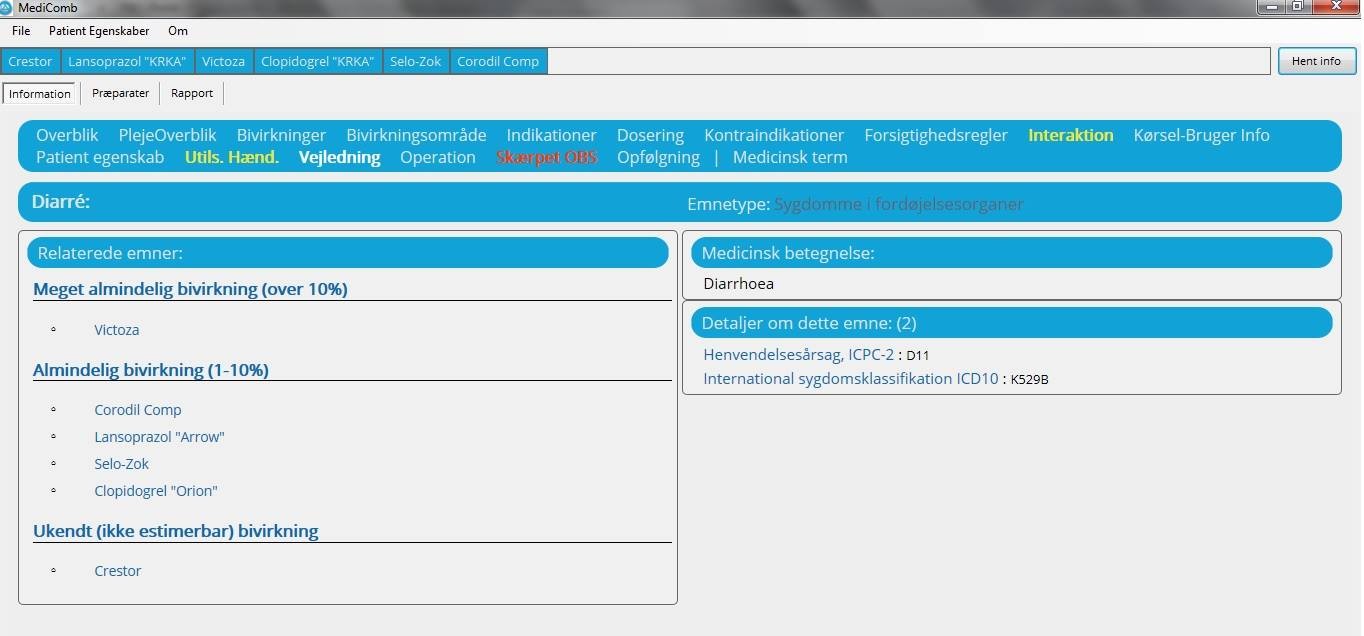MediComb A/S has developed a drug information system providing an instant overview of treatment with many simultaneous drugs, often characterized as polypharmacy. Below is our recent interview with Henrik Reiche CEO at MediComb A/S:
Q: Could you provide our readers with a brief introduction to Medicomb and your services?
A: MediComb A/S is a Danish Start-up, which has developed a drug information system providing an instant overview of treatment with many simultaneous drugs, often characterized as polypharmacy.
MediComb delivers two distinct services: a decision support tool for healthcare professionals e.g. General Practitioners, Dentists, Hospitals, Pharmacies and the Care Sector. The public version of the system is designed for consumers (patients or relatives), empowering drug users to validate the utility of their medication
Though the system manages complex information from many sources it is quite intuitive to use and requires only a simple list of a patient’s drugs, possibly supplemented with patient characteristics as sex, age, weight or patient types like impaired liver or kidney function etc.
The MediComb system is developed in cooperation with researchers in healthy ageing and pharmacological experts and has gone through a thorough assessment with quite impressive result: Analyzing the medication of nursing homes residents revealed severe problems caused by medication for not less than 50 % of the residents.
 Recommended: An Interview With Xavier Dupont, Former CEO Of Maestro & Falcom Holdings
Recommended: An Interview With Xavier Dupont, Former CEO Of Maestro & Falcom Holdings
Q: What makes your products unique?
A: We deliver a technological solution that may defuse the so-called ”Elderly demographic time bomb” and this is probably the reason for our nomination this year for Healthcare and Pharmaceutical Awards by Global Health & Pharma magazine.
Polypharmacy problems has existed for years, it is well-known and recognised, but answers have been difficult to find. Interaction checkers have reduced the risk of severe medicine errors, but not the problem itself. Lack of knowledge and the fact that clinical trials to throw light on the effect of a treatment with 8, 14, 26 or even 32 different simultaneous drugs is impossible to carry out, leads to an unresolved, but growing problem.
Though most drug information today is digitalized, it is basically still document based, meaning that users have to read many pages of information for each individual drug, search for many types of additional information and try to manually establishing an overview of the possible outcome or potential risks of a multi-drug treatment. It is time-consuming, expensive and rarely done.
That is why multi-drug patients most likely will increase the number of drugs, due to the so-called “prescription cascade”: additional drugs are prescribed to treat adverse effects of the used drugs, which trigger a continuous spiral.
If, on the other hand, it is possible to make use of existing knowledge, make it much more useful and precise, and make it possible to extract and merge, this may in fact create new sought after knowledge about the possible effects of multi-drug use.
This is the pioneering work that MediComb A/S has done by creating a software-based medicinal system, which breaks the principle of document based drug information. By dismantling all types of drug information into hundreds of information elements it is possible to merge and combine information across drugs, clinical guidelines, unintended events etc.
This enables the system to provide the long sought knowledge about the possible effects of multi-drug use.
Q: Who are your clients?
A: Private and public healthcare providers, private and public care providers, insurance companies searching for solutions to reduce spending on drugs or cost of care.
Basically we provide “more welfare for less money”.
 Recommended: An Interview With Gregory Shore, CEO At Crystal Shore Dashboards
Recommended: An Interview With Gregory Shore, CEO At Crystal Shore Dashboards
Q: What are some of the key challenges you’re helping them solve?
A: The cost of an ageing population is a major challenge to all Western countries and forecasts predict the cost to threaten finances of these countries. The growing number of elderly use an increasing number of drugs causing a raise in costs, but also an increase in costs of treating undesirable effects and expenses to social care. For the patients it may also cause severe loss in quality of life.
But what if societies (or insurance companies) are spending large amounts of money for inappropriate medication that may harm elderly simply because no one is capable of surveying the rapid growing number of drugs per patient?
It is estimated that a reduction in inappropriate medication may reduce the overall spending on drugs around 15 %, may reduce hospital admissions around 5 % and may reduce cost of care 10 – 20 %. In addition such reduction may improve the patient’s quality of life remarkably.
Q: Is inappropriate medication really such problem?
A: It is important to stress that inappropriate medication in most cases is the sum of many good wills. Doctors follow the guidelines for each individual disease or suffering, but as researchers points out: The overview gets lost and adverse effects may be treated by additional drugs. Especially elderly suffering from more chronic diseases has the risk of ending up with a cocktail of inappropriate drugs, gradually leading to even more drugs. In fact we have seen a patient using 32 different types of drugs every day.
Just a few numbers may illustrate the situation:
- Australia: the average number of medicines prescribed for older inpatients is 9–10 per patient,
- Scotland: proportion of adults dispensed ≥5 drugs doubled to 20.8%,
- 25 % of Canadian seniors prescribed 10 or more drugs.
- Sweden: 44 % of elderly (65+) using 5 or more drugs, 12 % using 10+, about 20% started polypharmacy every year
- European Study across 57 nursing homes in 7 countries disclosed that 50 % nursing home residents is using 5 or more drugs, 24 % is using 10+.
- Australia: Analysis of PIM (Potentially Inappropriate Medication) suggest 20-60 % prevalence!
 Recommended: The Floow Makes Mobility Safer And Smarter For Everyone
Recommended: The Floow Makes Mobility Safer And Smarter For Everyone
Q: What can we expect from Medicomb in the future?
A: The potential problems of overmedication, inappropriate medication and polypharmacy is known and recognized issue in all Western countries, facing an ageing population, a growing use of preventive medicines, rising public spending on medicine and rising cost to treat the consequences of more medicine.
MediComb A/S has already had contacts with interested and supporting healthcare experts in several countries. Healthcare is, however, organised in many different ways and entering these market requires usually local knowledge. MediComb has plans for entering primarily English speaking countries and is currently searching for national partners.
Because of the experienced inertia of healthcare systems it has been decided to launch an international English-language so-called “MediChecker”-app designed for patients and relatives to empower them to check the utility effect of their medication. As soon as the financials are in place the pay-per-view app will be launched very likely from Ireland.
Activate Social Media:


